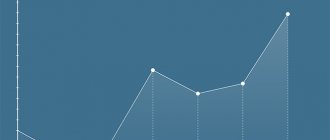What affects the income of the Swiss
Monthly payments depend on annual earnings, which by default includes the thirteenth salary. If an employee has been employed at the company for less than a year, he retains the right to a bonus, but its size will be indexed by the number of months actually worked.
The state takes care of its citizens: the 13th salary is designed to reduce the tax burden: it goes entirely to taxes
An agreement is concluded between the employer and employee associations - trade unions - which determines the workload for the calendar month and the length of the working day. You cannot work more than 45 hours a week. Overtime is paid at a rate of 1.25.
What you need to know about Switzerland:
Cost of living and taxes in Switzerland
The Swiss keep track of their money. More than 70% of families live in rented apartments. For example, you can rent a house with an area of 100 m2 for 2,140 francs (139,942 rubles), and given that, according to the Swiss Real Estate Offer Index, 1 m2 of area will cost 6,316 francs (413,025 rubles), your own real estate with an area of 100 m2 will cost from 631,600 francs (41.3 million rubles).
According to Numbeo, the largest database on the cost of living in different countries, a set lunch for two in a mid-level restaurant will cost from 100 francs (6,534 rubles).
Local markets offer products at the following prices:
| Name of product | Price, in francs | Price, in rubles |
| 1 liter of milk | 1,59 | 103 |
| 1 loaf of bread | 2,64 | 172 |
| 1 kg rice | 2,67 | 174 |
| 1 kg cheese | 23,23 | 1515 |
| 1 kg chicken fillet | 25,03 | 1633 |
| 1 kg potatoes | 2,63 | 171 |
| 1 pack of Marlboro cigarettes | 8,2 | 525 |
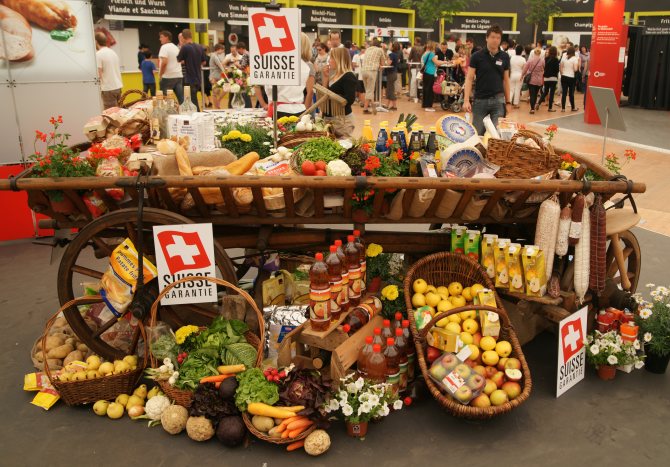
Residents of Switzerland are sensitive to products, and this is not surprising: they are of excellent quality and very expensive
Taxes are collected at three levels: federal, cantonal and municipal. Federal taxes are collected on wages. The employer withholds income tax. The amount of contributions directly depends on the employee’s income.
| Annual income, in francs | Annual income, million rubles | Federal tax, in francs | Federal tax, in rubles | Annual rate (income tax), % |
| up to 31 600 | up to 2 | — | — | 0,77 |
| 31 600–41 400 | 2–2,7 | 131,65 | 8610 | 0,88 |
| 41 400–55 200 | 2,7–3,6 | 217,9 | 14 251 | 2,64 |
| 55 200–72 500 | 3,6–4,7 | 582,2 | 38 077 | 2,97 |
| 72 500–78 100 | 4,7–5,1 | 1 096 | 71 676 | 5,94 |
| 78 100–103 600 | 5,1–6,7 | 1 428 | 93 393 | 6,6 |
| 103 600–134 600 | 6,7–8,8 | 3 111 | 203 465 | 8,8 |
| 134 600–176 000 | 8,8–11,5 | 5 839 | 381 888 | 11 |
| 176 000–755 000 | 11,5–49,3 | 10 393 | 679 733 | 13,2 |
| from 755,000 | from 49.3 | 86 848 | 5 680 119 | 11,5 |
The tax scheme is the same for local residents and foreigners.
The minimum pension in Switzerland is 4,000 francs (261,556 rubles). The amount may seem significant, but it is not the highest figure in the European Union. However, there are pensioners who receive up to 7,000 francs.
Highest salaries

What professions pay especially well in Switzerland? Diplomats, for example, earn very good money. The head of a diplomatic or consular mission in Switzerland receives an average of 13,474 francs per month. An air traffic controller with 15 years of experience earns 13,106 francs per month. Gymnasium teachers in the canton of Zurich clearly do not complain about their salaries: with sufficient teaching experience, they can earn up to 14,900 francs per month. A primary school teacher receives a much more modest amount - an average of 6,981 francs. A chief physician with relevant work experience in the canton of Zurich can expect an average salary of 12,824 francs; an assistant doctor receives 7,436 francs per month.
Minimum salary in Switzerland in 2021
The minimum wage is not established at the state level, with the exception of some industries (tourism, hotel business, catering) in which migrant labor may be unfairly paid.
The cost of living is 29 thousand francs (1.9 million rubles) per year, or about 2,400 francs (156,583 rubles) per month. This is almost 15 times more than in Russia (for reference: PM in the Russian Federation in the second quarter of 2021 is 11,185 rubles). The minimum income is received by low-skilled personnel: cleaners, laborers, janitors.
In 2021, the highest minimum hourly wage in Europe was introduced in the canton of Neuchâtel - 20 francs (1,304 rubles). Regional authorities made a corresponding decision back in 2011, but the law was appealed by some companies, organizations and individuals.
The poverty threshold in the country is 2,247 francs (146,449 rubles) per month for one person and 3,981 francs (259,463 rubles) for a family of two adults and two children. About 7% of the population lives below the poverty line in Switzerland. This data is provided by the Federal Statistical Office. Of those working, 3.9% of citizens faced poverty. However, one must understand that the Swiss “poverty line” differs sharply for the better from the Russian one.
The Swiss rejected the high minimum wage in a referendum:
Ratio of living expenses to salary income in Switzerland
Despite the fairly high income, in Switzerland it is not at all customary to demonstrate a luxurious life. Even the richest keep track of their income. Residents of the country are quite restrained in their spending. More than 70% of the population prefer to rent housing. Renting an apartment in the city with an area of 100 square meters will cost about 2500-3000 euros per month. Plus utility costs equal to 2% of the cost of the apartment per year.
Dinner at a restaurant within the resort area without alcohol will cost 120 euros. In Switzerland, food prices are very high, especially meat. Price 1 kg costs from 20-80 euros. For 0.9 euros you can buy 1 liter of milk and for 2 euros – 0.5 kg of bread.
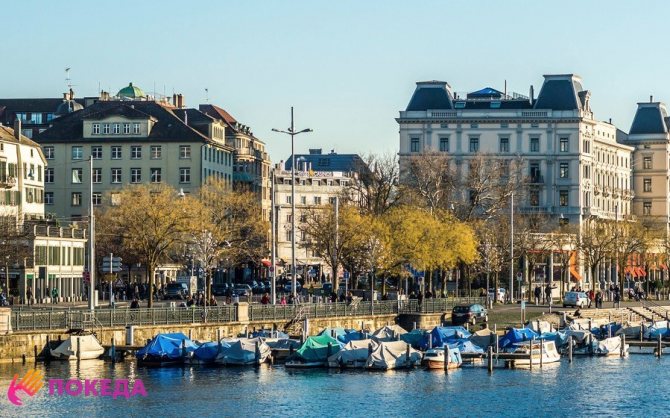
Only clothes and shoes can be purchased at regular prices in other European countries, especially during the sales season, when discounts reach 75%.
There is no free medical care in Switzerland, which is perhaps why their medicine is considered one of the best in the world. Medical assistance of any kind can be obtained only on a paid basis. To get advice from a specialist you will need to pay an average of 150 euros. Compulsory insurance is also provided. Insurance policies are available from more than 130 companies in the country.
Prospects for non-residents of the country and the unemployment rate
Not many migrants can count on finding employment in Switzerland. You need to try to find a job before arriving in the country. This can be done on special websites, with the help of intermediaries, or using the services of a recruitment agency. The easiest way to find work is in the service or trade sectors, or as assistants to local residents on farms or with household chores.
Without knowledge of the language, finding a job in international organizations will be extremely difficult. Despite the fact that in each region of the country the languages are different. To get a job in the southern part of Switzerland you need to speak Italian, in the western part you need to speak French, and in the eastern part you need to speak German.
Without knowledge of the language, special qualifications or work experience, you won’t have to wait for an easy and highly paid job. The average earnings of a migrant with a 12-hour working day in agriculture, fishing or forestry will be about 2-4 thousand euros per month.
Working as a taxi or bus driver, you can also earn about 4 thousand euros. However, without a license of the required category and less than 5 years of driving experience, this vacancy cannot be obtained either.
Unemployment
In Switzerland the percentage of people not working is very low. It is only 3.2%. Job loss insurance is mandatory for all hired employees. Competition for jobs in Switzerland is very high. First of all, citizens of their own country get jobs first, and then migrant candidates are considered. You can also obtain refugee status in Switzerland, this will simplify employment.
However, having a qualified specialty, correct paperwork and knowledge of the language will be an excellent help for anyone who wants to find a job in Switzerland.
Average salary in Switzerland in 2021
After withholding taxes and social benefits, the average salary in Switzerland is 6,257 francs (407,995 rubles). This is 9.5 times more than in Russia (the average monthly salary in the Russian Federation is about 44 thousand rubles).

Many residents of the country and visitors work in the tourism business, where the salaries are good
Before deductions, the amount that the Swiss receive is just over 10 thousand francs (651,865 rubles).
Average salary in Bern, Zurich, Basel
The regional factor significantly influences the salary level. In Zurich, the largest city in Switzerland, the median income of the population reaches 7,820 francs (509,754 rubles) per month net. Official statistics provide the following data: 25% of city residents earn more than 10 thousand francs (651,860 rubles), another 25% have an income of less than 6 thousand francs (391,166 rubles).

Watches are the hallmark of Switzerland: the International Watch Fair BaselWorld is held annually in Basel
In Bern, Basel, Geneva, a monthly salary of 10 thousand francs (651,860 rubles) net is not uncommon. The incomes of the population living in Konitz, Thun and La Chaux-de-Fonds are closest to the national average. Small salaries in Grisons and other highland areas, Ticino - less than 5.4 thousand francs (352,117 rubles).
Features of salary payment
The salary here is paid in a lump sum, once a month, but there is also a 13th salary. Thus, the annual salary is paid for 13 approaches - at the end of the year, each employee receives the 13th salary. If he has worked for less than a year, he will still receive 13 salaries, but its size will be proportional to the time he worked. You must understand that this type of remuneration has nothing to do with bonuses or bonuses.
There is actually no minimum wage here; it is established only in some sectors - for example, in catering or in the hotel industry (thereby reducing the risk of using unskilled labor for low pay).
At the next national referendum, the proposal to introduce a minimum wage was rejected - according to citizens, the minimum wage would lead to small businesses having to change the prices of their goods and services, because they would be required to pay a minimum wage of 4,000 francs.
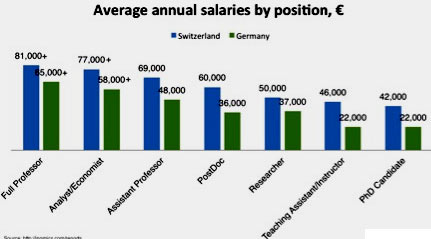
Comparison of salaries in Switzerland and Germany
Salaries by profession in Switzerland
The Ministry of Labor and Employment (Zurich) regularly publishes a report that lists current salaries for almost all major occupations.
In 2021, the document shows average starting salaries (in the first year of work):
| Profession | Salary, in francs | Salary, in rubles |
| Hairdresser | 2601 | 168 929 |
| Graphic Designer | 3800 | 246 802 |
| Florist | 3800 | 246 802 |
| Salesman | 3900 | 253 310 |
| A carpenter | 4018 | 260 974 |
| Postal employee | 4031 | 261 819 |
| Baker | 4051 | 263 118 |
| Auto Mechanic | 4450 | 289 033 |
| Train conductor | 4558 | 295 944 |
| Software Developer | 4608 | 299 190 |
| City transport driver | 4858 | 315 424 |
| Civil Engineer | 5411 | 351 493 |
| Journalist | 5551 | 360 787 |
| Social worker | 6246 | 405 731 |
| Pilot | 6576 | 427 407 |
| Teacher | 7398 | 480 833 |
| Bank consultant | 7788 | 506 181 |
| Pastor | 9084 | 590 340 |
| Prosecutor | 10 400 | 675 863 |
These salaries are at least 30-50% higher for experienced professionals. Salaries also increase as you progress in your career.
Labor market
The common problem of developed European countries - the aging of the population - has not bypassed Switzerland. Today, population growth is mainly due to migrants. Around 275 arrivals per day are expected in 2021. According to statistics, the proportion of foreigners in the country is 25%, and there are plenty of jobs. In the employment sector, the share of foreign citizens is 32%. At the same time, quotas for attracting foreign workers are constantly growing.
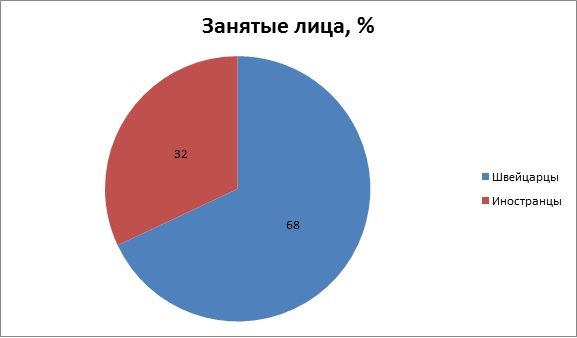
Most of the residents are employed in the service sector, industry is in second place, and agriculture is in last place (it meets its own needs by 60%).
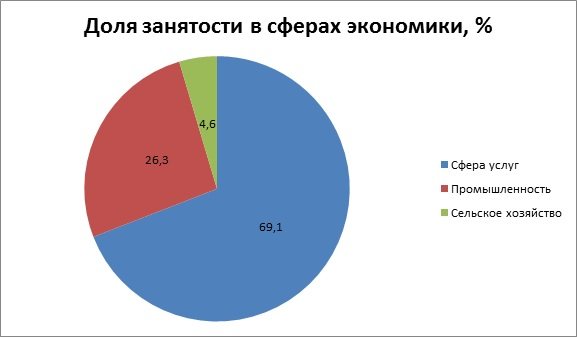
The unemployment rate among its own citizens is a record low for Europe - 2.8%, and the share of unemployed among young people is even lower - 2.4%, which indicates the competent policy of the authorities in the labor market. During the year, these figures fluctuate slightly, which is due to the presence of seasonal work in agriculture and tourism.
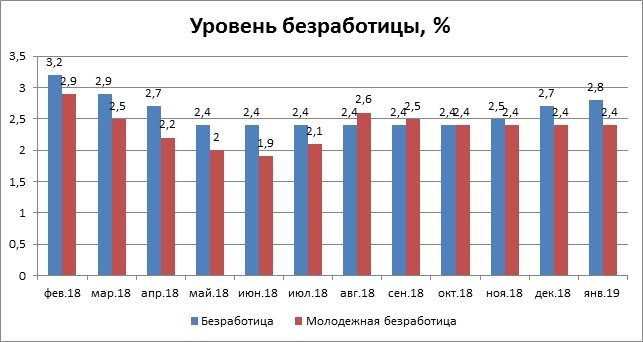
For foreign citizens, the unemployment rate was 8.8% (beginning of 2021). Employers are more interested in applicants with higher education, language skills and work experience. There are quite a lot of migrants applying for jobs that do not require education or special skills.
The highest paid professions in Switzerland
In Switzerland, insurance and banking are considered the most profitable. A highly qualified financial director can earn about 21 thousand dollars (1.3 million rubles) per month. High salaries for qualified pharmacists and doctors, top managers, IT specialists, and translators.
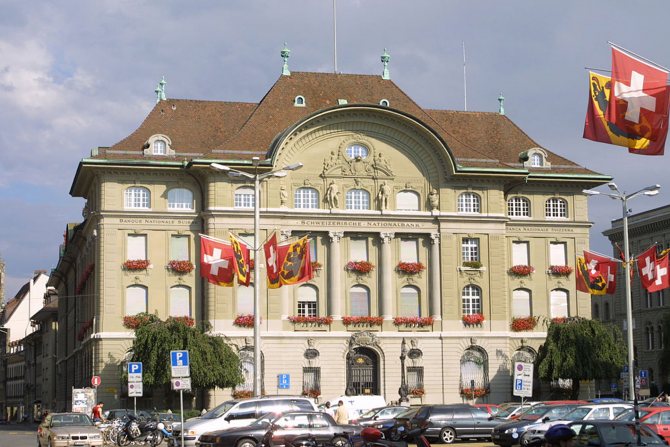
Salaries of Swiss bank employees are much higher than average
Income of top management in various industries (according to data from the Business Switzerland publication):
- hotel business - 11,827 francs (770,168 rubles) per month;
- construction - 16,065 francs (1 million rubles);
- manufacturing sector - 22,397 francs (1.45 million rubles);
- private business - 23,444 francs (1.5 million rubles);
- insurance - 43,281 francs (2.8 million rubles);
- banking - 52,151 francs (3.4 million rubles).
How much do members of parliament in Switzerland earn?
This fact will seem interesting to Russians: members of parliament in Switzerland receive only 66 thousand francs (4.2 million rubles) per year, or about 5,500 francs (357.8 thousand rubles) per month. The parliament is “police”, that is, amateur.
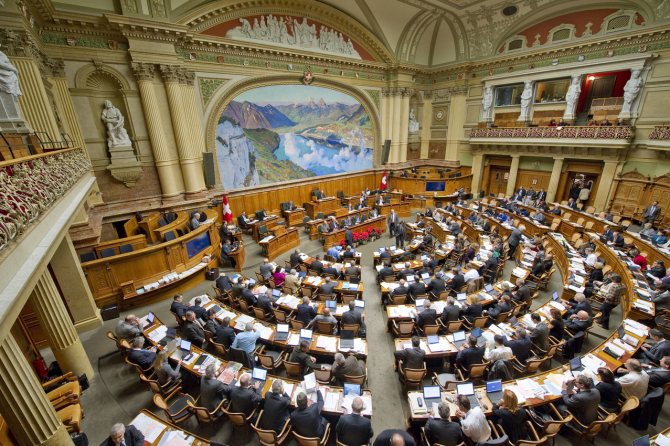
Meeting of the Swiss Parliament
Deputies come to sessions four times a year, without leaving their main profession.
Average salaries in Switzerland seem incredibly attractive to foreigners, but the Swiss themselves do not consider them as such, citing the high cost of living.
Salary level
It is very difficult for Russians to get a job in this country. There is a high level of competition for jobs here.
It is worth noting the following incomes of the Swiss population by profession:
- Low-skilled workers – 2-2.5 thousand euros.
- Construction workers 7.5 thousand.
- Civil servants 8 thousand
- Drivers and farmers receive 4-4.5.
- Programmers – 7.5-8 thousand.
- Engineers 9 thousand
There is no such official concept as average earnings in Switzerland. But for some professions the minimum wage is determined.
So, how much do they earn in Switzerland? The average salary is approximately 5.7 thousand euros. Swiss salaries may vary depending on the region.
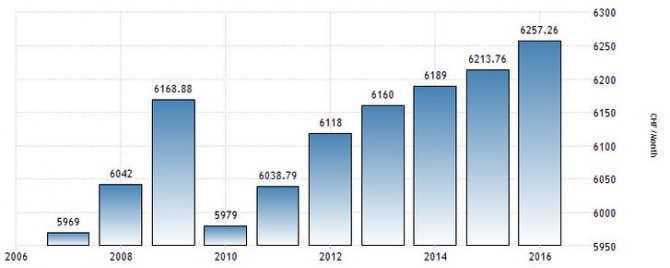
Average salary in Switzerland
Salary indicators demonstrate the strengths and weaknesses of the economy. Income depends on changes in exchange rates. Men get more than women. The difference between incomes is 25%.
Highly paid and prestigious positions are occupied by local residents. The rate depends on the level of education, profession and qualifications.
Employees without experience, education or qualifications can expect to earn $16 per hour. If you have at least 4 years of experience, you will be paid $17.50. Specialists of the highest category earn from $20 per hour.
How much foreigners earn in Switzerland depends on their qualifications. There are categories of invited foreigners who can earn more than local residents in the same position.
When concluding an agreement with an employer, the minimum salary must be indicated. Many companies in the country operate on a 45-hour work week. Overtime is paid 20% above the regular rate. The minimum salary is 2.2 thousand, but such a salary is rare even for small regions of the country.

